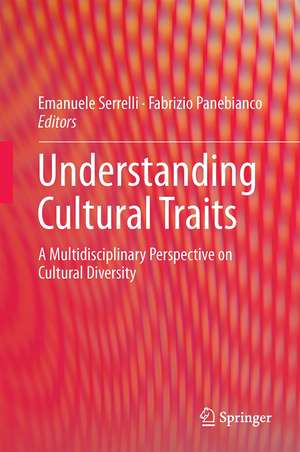Understanding Cultural Traits: A Multidisciplinary Perspective on Cultural Diversity
Editat de Fabrizio Panebianco, Emanuele Serrellien Limba Engleză Hardback – 4 mar 2016
| Toate formatele și edițiile | Preț | Express |
|---|---|---|
| Paperback (1) | 646.43 lei 6-8 săpt. | |
| Springer International Publishing – 7 apr 2018 | 646.43 lei 6-8 săpt. | |
| Hardback (1) | 652.81 lei 6-8 săpt. | |
| Springer International Publishing – 4 mar 2016 | 652.81 lei 6-8 săpt. |
Preț: 652.81 lei
Preț vechi: 768.01 lei
-15% Nou
Puncte Express: 979
Preț estimativ în valută:
124.92€ • 130.86$ • 103.53£
124.92€ • 130.86$ • 103.53£
Carte tipărită la comandă
Livrare economică 08-22 aprilie
Preluare comenzi: 021 569.72.76
Specificații
ISBN-13: 9783319243474
ISBN-10: 3319243470
Pagini: 410
Ilustrații: VIII, 410 p. 35 illus., 14 illus. in color.
Dimensiuni: 155 x 235 x 24 mm
Greutate: 0.76 kg
Ediția:1st ed. 2016
Editura: Springer International Publishing
Colecția Springer
Locul publicării:Cham, Switzerland
ISBN-10: 3319243470
Pagini: 410
Ilustrații: VIII, 410 p. 35 illus., 14 illus. in color.
Dimensiuni: 155 x 235 x 24 mm
Greutate: 0.76 kg
Ediția:1st ed. 2016
Editura: Springer International Publishing
Colecția Springer
Locul publicării:Cham, Switzerland
Cuprins
Cultural Traits and Multidisciplinary Dialogue; Fabrizio Panebianco and Emanuele Serrelli.- Understanding Cultural Diversity. Culture Traits and Cultural Changes between Global and Local Scales; Vincenzo Matera.- Culture Traits and Identity; Ugo E.M. Fabietta.- The Diffusion of a Museum Exhibit: The Case of the Transparent Man; Elena Canadelli.- The ''Incompetent Subject' in the Kingdom of Technical Terms. A Possible Role of Pedagogy in the Study of Cultural Traits; Rossana Brambilla.- Chapter 6. Ihe Unary Trait of Psychoanalysis. Identification, Transmission, Generation; Matteo Bonazzi.- Cultural Diversities Across and Within Cultures: The Bicultural Mind; Olivia Realdon and Valentino Zurloni.- Birth and Evolution of Jazz as Effects of Cultural Transfers; Stefano Zenni.- Geographical boundaries as Places of Meeting and Diffusion of Cultural Traits; Stefano Malatesta, Marcella Schmidt di Friedberg and Enrico Squarcina.- Maps, Diagrams and Charts: Making the Cultural Trait Visibe; Fulvio Carmagnola.- Evolutionary Genetics and Cultural Traits in a 'Body of Theory' Perspective; Emanuele Serrelli.- Cultural Traits in Economic Theory; Fabrizio Panebianco.- International Cooperation and Cultural Transmission; Isa Gama.- Rethinking Organizational Culture: The Role of Generational Subcultures; Alessandra Lazazzara.- From Material Remains to Culture: The Possibilities and Limits of Archaeology in Reconstructing Ancient People; Viviana Ardesa.- Homology and Phylogenetic Inference in Biological and Material Cultural Evolution; Ilya Tëmkin.- On the Origin of Technologies: The Invention and Evolution of the Bow-and-Arrow; Giuseppe Carignani.- Trees, Languages and Genes: A Historical Path; Federica Da Milano and Nicoletta Puddu.- Signaling in Style: On Cooperation, Identity and the Origins of Visual Art; Larissa Mendoza Straffon.- Aesthetic Preferences: An Evolutionary Approach; Lorenzo Bartalesi and Mariagrazia Portera.- Nothing but Survival: On the Origin and Function of Literature; Mario Barenghi.- Removing Barriers in Scientific Research: Concepts, Synthesis and Catalysis; Emanuele Serrelli.
Notă biografică
Emanuele Serrelli is a philosopher of science interested in interdisciplinarity within and across the natural and social sciences. He works with several Italian universities. He was visiting scholar at the University of Utah, and visiting fellow at the Sydney Centre for the Foundations of Science, at the Lisbon Applied Evolutionary Epistemology Lab, and at NESCent National Center for Evolutionary Synthesis, Durham, NC. As a member of the scientific board of CISEPS Center for Interdisciplinary Studies in Economics, Psychology and Social Sciences, University of Milano Bicocca, he leads the “Cultural Evolution” research program. As a philosopher of biology, he is trained in evolutionary theory, where he also studies interdisciplinarity and modeling. Fabrizio Panebianco is an economist working on the economics of cultural transmission and on the role played, in this process, by the network of social interactions. He fosters a highly interdisciplinary research agenda merging different evolutionary approaches. He worked in several italian and european universities and now works in Bocconi University. He is member of the scientific board of CISEPS Center for Interdisciplinary Studies in Economics, Psychology and Social Sciences, University of Milano Bicocca, and worked in the “Cultural Evolution” research program.
Textul de pe ultima copertă
This volume constitutes a first step towards an ever-deferred interdisciplinary dialogue on cultural traits. It offers a way to enter a representative sample of the intellectual diversity that surrounds this topic, and a means to stimulate innovative avenues of research. It stimulates critical thinking and awareness in the disciplines that need to conceptualize and study culture, cultural traits, and cultural diversity. Culture is often defined and studied with an emphasis on cultural features. For UNESCO, “culture should be regarded as the set of distinctive spiritual, material, intellectual and emotional features of society or a social group”. But the very possibility of assuming the existence of cultural traits is not granted, and any serious evaluation of the notion of “cultural trait” requires the interrogation of several disciplines from cultural anthropology to linguistics, from psychology to sociology to musicology, and all areas of knowledge on culture. This book presents a strong multidisciplinary perspective that can help clarify the problems about cultural traits.
Caracteristici
Offers a gateway to a fundamental concept, the basis for understanding culture Is an exercise in thinking across boundaries Shows great potential for public policy and intercultural research Includes supplementary material: sn.pub/extras



